As a young reporter for the Boston Globe, I stumbled onto the existence of the Pentagon Papers.
-
Summer 2021
Volume65Issue5
The story was part accident, part reward for curiosity.
It began because my boss at the Boston Globe, legendary editor Tom Winship, had a relentless interest in matters from the momentous to high-quality gossip. His newspaper was one of the first to question the conduct of the Vietnam War, and he insisted that I – a 25-year-old reporter in the paper’s Washington bureau – arrange a lunch roughly once a month with significant figures in the anti-war movement so he could have regular, direct exposure to the latest goings on.
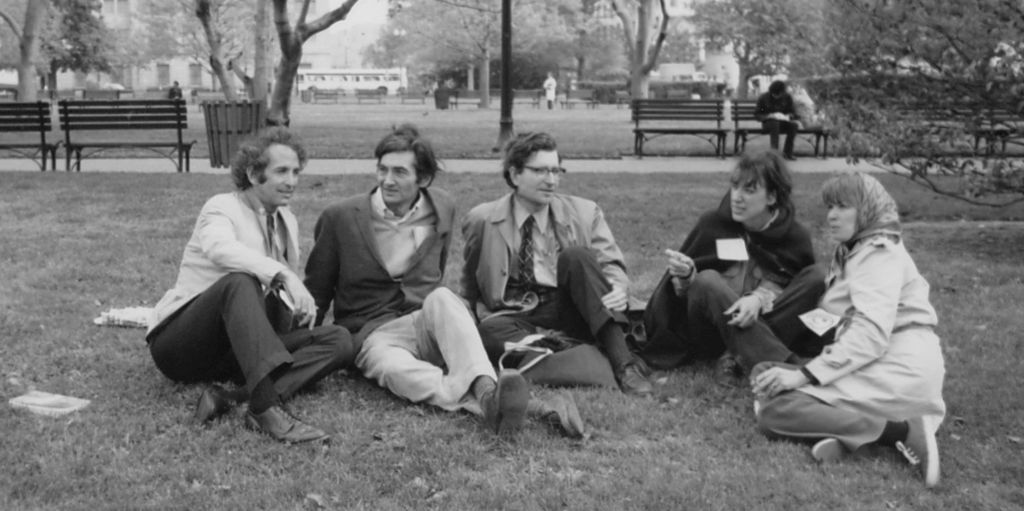
Around the first of that March in 1971 our guest at a popular Chinese joint in Cambridge was the renowned linguistics professor, Noam Chomsky, even then a go-to person in anti-war circles. At the moment, the hot war story was a failed invasion into nominally neutral Laos by South Vietnamese forces directed by the U.S.
The political temperature in this country was rising again.
Ellsberg claimed that for twenty years, American leaders had repeatedly and knowingly lied to the public.
At some point, Chomsky said there was a new arrival in Cambridge I should look up – someone who had been involved with the war in both the Pentagon and Vietnam itself – an ex-Marine with a Harvard doctorate named Daniel Ellsberg. Ellsberg had turned against the entire enterprise and was becoming increasingly active, having just written a long piece about the Laos mess in the New York Review of Books.
Ellsberg’s view was that for twenty years, the steady Americanization of the Indochina conflict had followed a maddeningly consistent pattern – repeated escalation that was known by policy makers and their expert advisors to be insufficient to “win” the war, but just enough to avoid “losing” it in the short run, all of it accompanied by repeated lies to the public. He insisted that the syndrome was continuing under Richard Nixon and Henry Kissinger.
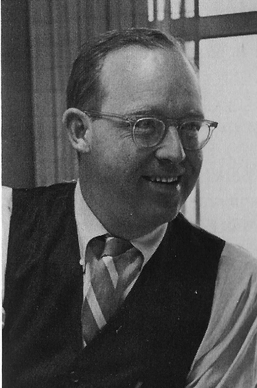
At some point, I remarked to him that his knowledge seemed extremely detailed, and that was when he suddenly began talking about the massive study he had worked on for some eight months in 1968. Until that moment, I thought I was having a long, get-acquainted talk with an interesting, experienced Vietnam hand; now, there was a story to develop.
Ellsberg outlined Robert McNamara’s decision to set up the project, eventually using three dozen experts with Vietnam experience, nearly all with top security clearances. Almost casually, he mentioned that one of the consultants on the early part of the project was Kissinger himself, then at Harvard. Ellsberg also said he had tried without success to get members of Congress to pry the study out of the Pentagon which continued to label it “top secret.”
Ellsberg told me had tried without success to get members of Congress to make the “top secret” report public.
He mentioned no names, but I quickly learned Ellsberg’s principal focus had been on Democrats George McGovern, then putting his improbable Presidential campaign together, and chairman J. William Fulbright of the Senate Foreign Relations Committee, before which Ellsberg had already testified.
Ellsberg told me that to that point hardly anyone beside himself had read the entire tome – some 7,000 pages, half original documents and the rest a meticulous narrative of the war based entirely on them.
He mentioned only two names: Morton Halperin, like Ellsberg a well-credentialed defense policy intellectual; and Leslie Gelb, a foreign policy establishmentarian who had been chosen by McNamara to be the study’s boss.
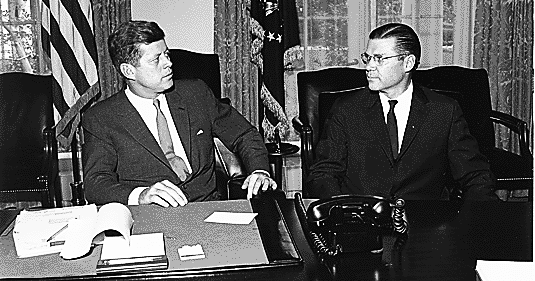
As dissent spread in their world, I knew that Halperin and Gelb had authored a widely quoted piece in The Washington Post entitled “Only a Timetable Can Extricate Nixon” after the invasion of Cambodia the previous year. I quickly returned to Washington and confirmed from each of them the basic elements of Ellsberg’s tale.
To my young mind, the story was that there was this very important, influential “thing” ordered by a Secretary of Defense, still under wraps, with the Nixon people refusing to make it available to Congress.
Little did I know.
My story based on the interviews ran on the front page of the Boston Globe the following Sunday, March 7, 1971. The headline read:
ONLY 3 HAVE READ SECRET INDOCHINA REPORT;
ALL URGE SWIFT PULLOUT.
I described the secret review of the history of the war ordered by McNamara and wrote, “Several individuals in the government at the time read parts of it, but as far as can be determined, only three men read every word of it.
Significantly, every one of them today is of the opinion that the United States should withdraw from Indochina unilaterally and swiftly. Moreover, every one of them, before deciding to leave government service . . . held sensitive jobs during the formative months of the Nixon Administration.”
After my piece ran, I got a call the next morning in the Washington Bureau.
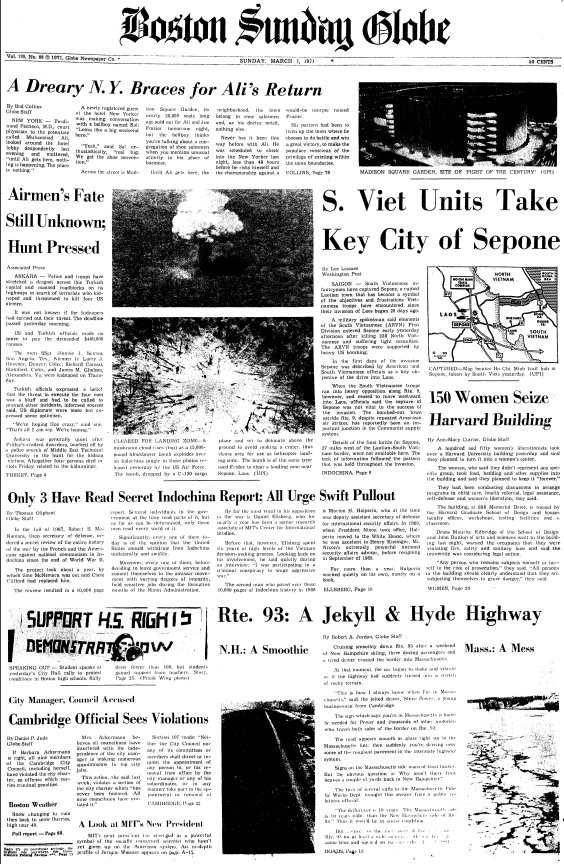
It was Henry Kissinger himself, whom I barely knew and who was not in the habit of contacting mere reporters. (I certainly never told him I had gotten a lousy grade in his international relations course).
In a couple of minutes of monologue, Kissinger wanted it recorded that Ellsberg had never been on his national security council staff. It was a classic Kissinger non-denial denial. The article never said Ellsberg had been on the White House staff, it said he had been a participant in the policy review Nixon ordered when he took office. By then, my view of his credibility fed the wisecrack that if Kissinger told you the sun was shining you might at least look out the window before you told your editor.
What the phone call really revealed was that Kissinger was very worried about both Ellsberg and the study, above all worried that more disclosures might be in store, including of the study itself. He was also aware that the story had increased interest and concern on Capitol Hill, and knew that on more than one occasion Fulbright had requested that Defense Secretary Melvin Laird release it.
What I didn’t realize at the time was that the story had also increased the backstage legal pressure on Ellsberg himself.
About a year earlier his ex-wife, Carol, had told him of a visit from an FBI agent inquiring about Ellsberg copying documents while he was still at the Rand Corporation in southern California, the research organization that had played a consulting role in the study’s creation and where a copy of the final product was locked in a safe to which Ellsberg had access. There had also been approaches on Capitol Hill.
As a result, Ellsberg increased his efforts in Cambridge to make still more copies and to store them more safely in the dwellings of friends. It was also in this period that Ellsberg’s occasional dealings about the study with New York Times correspondent Neil Sheehan (whom he had known in Vietnam) became more frequent and related to possible disclosure in the newspaper.
Much later, one of Ellsberg’s attorneys in his criminal case – Charles Nesson of Harvard Law School – told me that his client became convinced after reading my story that the Pentagon Papers could act as a “magic potion.” Mere exposure to their contents would make it impossible for anyone to view US involvement in Indochina as legitimate, Ellsberg believed.

As Ellsberg put it with characteristic passion to me, working on the Papers had “an enormous effect” on him. When he began, he said, “(I) viewed the war as a well-intentioned effort, reasonable though, in retrospect, mistaken. But it soon became completely clear that American decisions were really a series of desperate gambles, actually perceived as such by those who made them at the time. I was participating in a criminal conspiracy to wage aggressive war.”
Richard Nixon ran for president as a peace candidate, but largely continued Johnson's strategies in Vietnam. He tweaked the Vietnam policy, but the syndrome had continued.
The first Times story package on June 13, a Sunday, was of course a huge bolt from the blue.
I could immediately make an educated guess whose copy of the Papers had been used in it. The decision by Nixon two days later to go to court seeking the first injunction imposing prior restraint on a publication in American history prompted a realization on my part that the Times was not likely to be the sole avenue of disclosure. This was confirmed the following Friday when The Washington Post published more material from the Papers and immediately found itself in court as well.
At that point, the universal assumption was that the case would go relatively quiet, with the two papers under temporary restraining orders to freeze the status quo while it speedily moved toward the Supreme Court.
That was not my assumption.
I thought I had detected in Ellsberg’s use of the Post a strategy of continuing the disclosure, in effect flooding the zone with repeated publication of documents all over the country. After a brief overture to the television networks – rebuffed by the gun-shy moguls who feared the future of their broadcasting licenses – I was convinced there was much more to discover.
This was indeed Ellsberg’s intention.
He was most committed to getting every word of the Pentagon Papers into the public domain and into Congressional hands. Multiple, additional newspaper decisions to publish could obviously help and I was determined to be first in line.
American decisions about Vietnam were really a series of desperate gambles, and the leaders who made them knew they were risky, Ellsberg claimed.
When the first Times stories were published, Ellsberg was understandably unreachable but by then I was aware of several people in the Boston area who comprised a network of collaborators. I left my telephone numbers all over town.
By Friday evening, after the restraining order on the Post had taken effect, I was with my parents, helping care for an ailing father, a mostly disabled World War II veteran.
Shortly before midnight, the phone rang.
The call for me was from someone who identified himself as Mr. Bosbin (he had been Mr. Boston in his dealings with the Post). He asked if the Globe could move quickly to be the first post-restraining order entity to publish, despite the legal risks.
What followed were forty-eight hours of mostly logistical conversation with the very security conscious Ellsberg team, with each call to me followed by a call from me to a delighted Tom Winship at his second home in Vermont.
But there was one question Mr. Bosbin (I never learned who he was) pressed me on that had not been raised elsewhere: would we consider defying a court injunction against publication if one came down?
To a First Amendment absolutist like me it was a no-brainer, but my contact understood that I was hardly the decision maker. I was floored when Tom Winship said he thought it was a great idea, but would have to talk to the final links in the chain, Globe publisher W. Davis Taylor and company president John I. Taylor.
I was even more floored over the weekend when he reported back that these two dyed-in-the-wool, but strongly principled, Yankees agreed. I thus proceeded with the logistical details with the understanding that the paper was prepared to defy any eventual injunction against publishing.
Around Winship’s office, his joke was that if it came to that he would send me to Boston Common with a bulging briefcase, assemble a press conference and have me start reading aloud from the documents.
Ellsberg was committed to getting every word of the Pentagon Papers into the public domain and into Congressional hands.
The Globe story ran on the following Tuesday, focusing on John Kennedy’s Vietnam decision making. I also did an additional story for the package offering the first contact with Ellsberg in the week he had been at large; in essence he said he would surface shortly to face whatever consequences awaited.
True to Ellsberg’s design, the St. Louis Post-Dispatch quickly followed into print and became the fourth and last newspaper to agree to a restraining order. But that was just the tip of a very large iceberg.
By the time the Supreme Court acted on June 30, nineteen publications had put the Pentagon Papers into the public square, and the Nixon people had not bothered to go to court against fifteen of them. Even more importantly, there had finally been action of a remarkably gutsy nature on Capitol Hill.
A then-obscure junior Senator from Alaska had been one of the elected leaders Ellsberg had courted om his search for help in getting the Papers to Congress. Gravel, who was born and raised in Massachusetts, had attract Ellsberg’s attention not only because of his opposition to the war, but also because he had been organizing a filibuster to block the administration’s moves to gradually end the draft; Gravel, unsuccessfully, had fought to end it immediately.
Gravel had already received a complete copy of the Pentagon Papers (it was delivered by the same journalist who had obtained them for The Post, Ben Bagdikian). Like his colleagues, however, Gravel was skittish about doing anything.
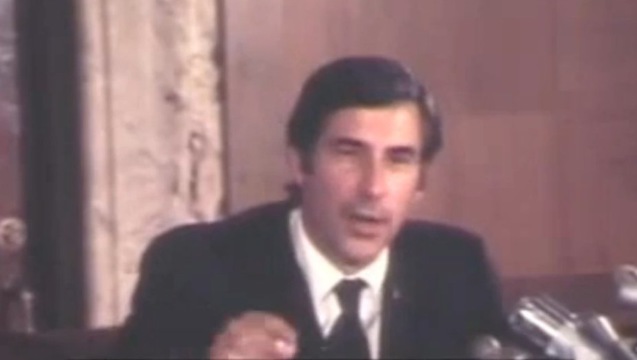
But when The Globe published its collection of the Papers, Gravel was persuaded it was time to act. An initial attempt to read from them on Friday on the Senate floor was blocked by Republican Senators; Gravel was quick, though to convene a meeting late the following evening of an obscure subcommittee he chaired overseeing federal buildings and grounds.
Declaring that money for their upkeep was tight because of spending on the war, Gravel once again began reading aloud; eventually there were no other members present to block Gravel’s order to make the entire study public by unanimous consent.
The Constitutional issue of prior restraint on four newspapers remained to be decided the following day, but in one major respect the decision was moot. The Pentagon Papers would have been public regardless of what the government did.
One more chance remained for the press to do its duty to the public.
By the time the Supreme Court acted on June 30, 19 publications had printed parts of the Pentagon Papers.
The first arrest warrant for Ellsberg was issued four days before the Supreme Court decision in Los Angeles where a grand jury had been empaneled. But there were persistent rumors that the Nixon administration might be planning something beyond Ellsberg’s copying and distributing the documents.
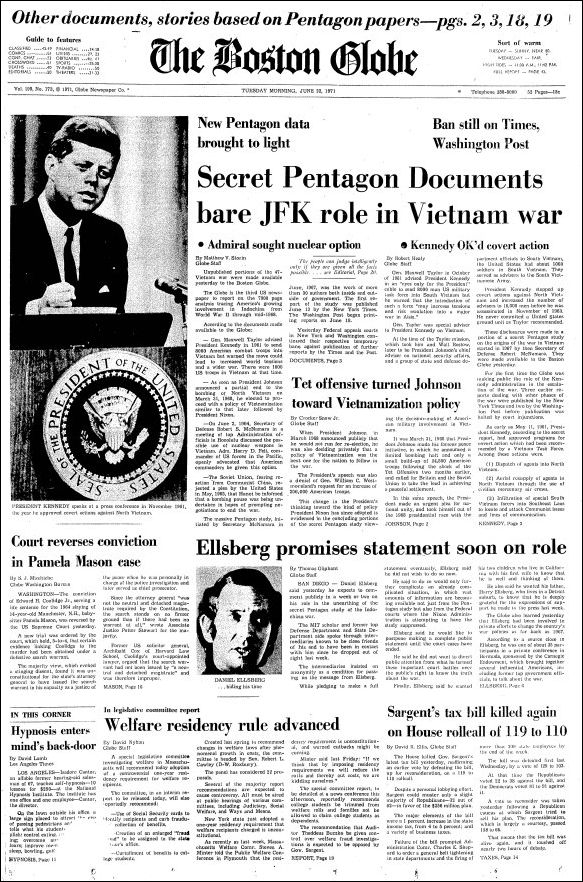
On July 12, a man literally walked into the Globe’s building, identified himself as an outraged member of a federal grand jury and said the government had begun presenting material involving the “leak” to newspapers including the Times, the Post and the Globe.
His identity was quickly confirmed, his details confidentially checked, and a story based on his information prepared; but the publisher wouldn’t run it.
In those days, newspapers didn’t have lawyers at their newsroom’s beck and call; they used the corporate counsel, answerable to the publisher. Our top attorney was a decent, ethical Yankee, but a fiendish stickler for procedure.
In his view we were breaching a bulwark of America’s justice system, the secrecy of grand jury proceedings, and as an officer of the court he could not countenance such behavior. To my surprise the publisher agreed with him.
In the middle of a furious argument, however, I noticed that Tom Winship and his exec, Bob Healy, were smiling at me. It had taken them no time to figure out a simple, untraceable defiance.
Back then, the Globe subscribed to a prestigious wire service run by The Washington Post and Los Angeles Times story about the grand jury could easily be published in our paper as well. In no time, Winship was on the phone to his dear friend, Ben Bradlee, for one of those “Boy have I got a story for you” chats.
Bradlee found a reporter with close Nixon ties (Ken Clawson, who eventually joined the administration) and Winship had me call and walk him through all our details.
The front page story began a series of events that ruined the administration’s efforts to open a successful second front in Boston in a case that eventually focused on a Los Angeles prosecution that suffered through delays and other snafus until Nixon’s egregious misconduct torpedoed it for good nearly two years later.
In the end, for all Ellsberg did for us, for a free press and for his country, ethics would hardly allow us to take a collection and pay him. The least we could do was help him beat the rap.

